
Bassist Aneesa Strings is a member of the SFJazz Collective and has launched a video production company to record artists in jazz, hip-hop and R&B.
One grew up in Detroit. One in Oakland, California. For both, the road to success as a jazz bassist passed through the Michigan State University College of Music.
Endea Owens (BA ’15) and Aneesa Strings (MM ’16) say they may have taken a different path had they not been mentored by Rodney Whitaker, the MSU director of Jazz Studies and University Distinguished Professor of Jazz Bass. Whitaker, they said, strengthened their self-confidence and ability to lead lives as professional musicians.
Today, Owens resides in New York City where she is the bassist for Jon Batiste’s Stay Human, the house band for the Late Show with Stephen Colbert. She records and collaborates and, in between, organizes community service and educational events.
Across the continent, Strings is releasing a new album after finishing a tour in New York City with jazz artists and rappers earlier this spring. She recently became a member of the SFJazz Collective, and has launched a video production company to record artists in jazz, hip-hop and R&B. From time-to-time, she records a podcast, involving casual conversations with artists.

In addition to collaborations with numerous jazz artists and organizing community service and educational events, Endea Owens is the bassist for Jon Batiste’s Stay Human, the house band for the Late Show with Stephen Colbert on CBS.
“I knew from the moment I met Endea and Aneesa that they had a special gift,” said Whitaker. “These two women were destined to excel and to lead through their music. I simply helped them a little along the way.”
Both bassists have good things to say about one another from first-hand knowledge and professional circles. The two overlapped briefly at MSU when Owens was an undergrad senior and Strings was a first-year graduate student.
“A lot of people say musicians from Oakland and Detroit are similar, but Aneesa has such a defined vibe to her playing,” said Owens. “She’s a lyrical bassist who takes her time with her ideas.”
Strings agreed that while the Oakland and Detroit jazz scenes are comparable, artists in Detroit might not be as “laid back” because of the cold and snow. But that, she said, never stopped Owens.
“She’s soulful and got the chops,” said Strings. “She makes the band sound really swing.”

Endea Owens stayed active during the pandemic, organizing Community Cookouts like this one in August 2020 in Harlem, New York where she performed with Negah Santos and some little helpers.
The Detroit Story: Endea Owens

Pre-pandemic, Endea Owens had a number of great opportunities to perform live, including the NPR Tiny Desk concert in November 2019 with Jon Batiste.
Growing up, Owens never really thought of playing the bass. Her mom had gotten her a keyboard when she was 8, and she began playing violin in school, rising to first chair in her high school orchestra. But things changed when her teacher issued an ultimatum: Start playing the bass or I’ll give you an ‘F.’
“Our orchestra needed a bass player, so I had to switch,” said Owens. “He told me I would thank him later on. But I simply didn’t believe him since I loved the violin so much.”
Owens says it’s time to truly thank her orchestra teacher. By transferring her talents to the bass, Owens began a journey that took her from the Detroit School of Arts to MSU to Juilliard, as well as to international stages and televised broadcasts. In addition to Whitaker, she was mentored by Marcus Belgrave and Ron Carter, and she was named among the 2019 class of emerging artists by the Lincoln Center for the Performing Arts. Her authentic style has led to invitations and tours with Jennifer Holliday, Rhonda and Diana Ross, Jazzmeia Horn, Dee Dee Bridgewater, Steve Turre, Lea Delaria, Wynton Marsalis, and most recently, Jon Batiste.
Although based in New York, Owens remains true to her Detroit and MSU ties. She remembers her early years taking the bus from her home on 7 Mile to rehearsals and performances in downtown Detroit. Her bass was always her traveling companion, slogging with her through ice and snow.
“I owe everything to my mother and mentors,” she said. “It was hard, but I knew it would be OK, being surrounded by people who believed in me, people who told me I could do this, too.”
After she heard Whitaker play at the Detroit School of Arts, Owens was determined to study with him at MSU. When it came time to apply for college, Owens took the Greyhound to East Lansing for her audition. When she deboarded, she got lost en route to the Music Building and almost missed her audition. Unnerved, she didn’t perform well. Reeling with self-doubt, she wondered if she had what it took.
“Rodney saw something in me though,” she said. “He told me it would be great, that I could make it, so I just went for it. He really pushed me and never minimized my voice. I became the musician I could be because of him.”
In addition to performing, Owens teaches, records, and coordinates the Community Cookout—an initiative to feed communities in need by distributing free meals in tandem with a free pop-up concert.
“I would love someday to come back where I started and develop an organization for young girls in the arts,” she said. “A lot of people have sacrificed for what we are able to do today. I just want to always be authentic to myself.”

In addition to performance, production, and podcasting, Aneesa Strings participates in workshops regularly, this one at Oaktown Jazz Workshops in April 2020. (Photo: Pendarvis Harshaw/ KQED)
The Oakland Story: Aneesa Strings

Aneesa Strings is in-demand and hopes the post-pandemic world will see a strong return of live music, like this tribute to the great Nancy Wilson that she played in September 2019. (Photo: Kevin Alvey)
Aneesa Strings grew up the last of seven children in the San Francisco Bay area. Although her parents had an expansive record collection and her dad had managed a jazz trio, no one in her family played music. That soon changed.
“My parents wanted at least one musician out of the seven,” said Strings. “And since I had a lot of energy, my mom said I needed to do something with it and made me play an instrument.”
While bass wasn’t her first choice, Strings started playing when her middle school didn’t have enough violins to go around. She wasn’t enamored at first, but gave it a try. In time, she informed her playing through singing, her deep voice uniquely paired with the resonance of the bass.
Strings met Whitaker through the Young Musicians Program at the University of California-Berkley. She was 12, and he liked what he heard. Strings remembers how he said she had a sound and a talent that not many people had. She didn’t believe him.
“My view was skewed,” she said. “The bass had come easy for me, so I didn’t see it and didn’t put in the time.”
The next year, Whitaker said something different. He told her he hadn’t seen much growth. He wondered if she was serious about being a professional. She told him she wasn’t sure she wanted to mix what she loved with a future career. When he shrugged and said ‘why not,’ she thought again.
“I knew I had to get it together,” she said. “Whenever I heard him play, I would cry. It was so beautiful. I didn’t want to disappoint such a great master, and appreciated that he saw talent in me.”
Strings stepped up her game. She was accepted in the SFJazz High School All Stars, and set her sights on college. Not wanting to be far from her family, she attended the University of Southern California. Earning her bachelor’s, she took the leap and moved across country to study jazz at MSU. Almost immediately, she felt at home.
“Being a woman and black and from East Oakland, I was sometimes an oddball in other programs,” she said. “MSU gave me a whole different view, and showed me there was a place for me in jazz. I hadn’t felt that way before.”
After graduating, Strings returned to the Bay area, performed and toured, went to New York, and recorded an album. In 2020, she came back to Oakland to explore and combine voice, bass and styles with the long-term goal of releasing works in multiple genres while heading up projects in video production.
“I feel it’s necessary to give flowers to those who help you,” said Strings. “If it weren’t for Rodney, I may not have stayed playing bass. I call him ‘the doctor’ because he has the ability to listen and know what you need. There’s nobody like him.”
Whitaker said that while these two strong, professional women in music come from different sides of the United States, they have much in common. Both are multi-talented bassists, entrepreneurs. And both, he said, are Spartans.
“I’m very proud of Aneesa and Endea,” Whitaker said. “I think we’ll be hearing a lot more about them as time goes on.”







